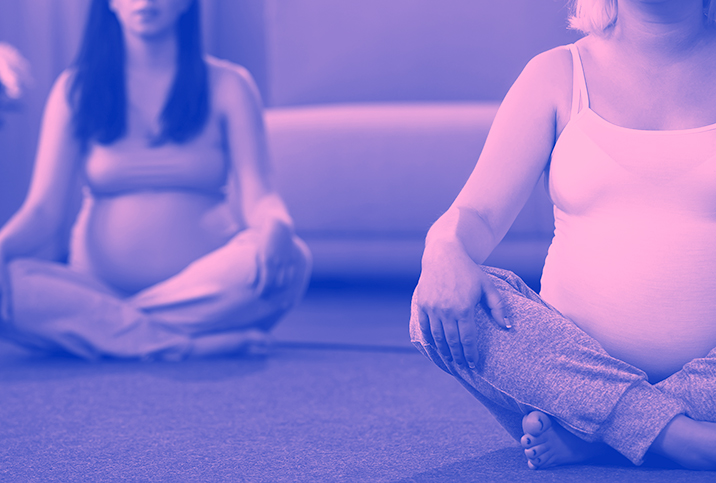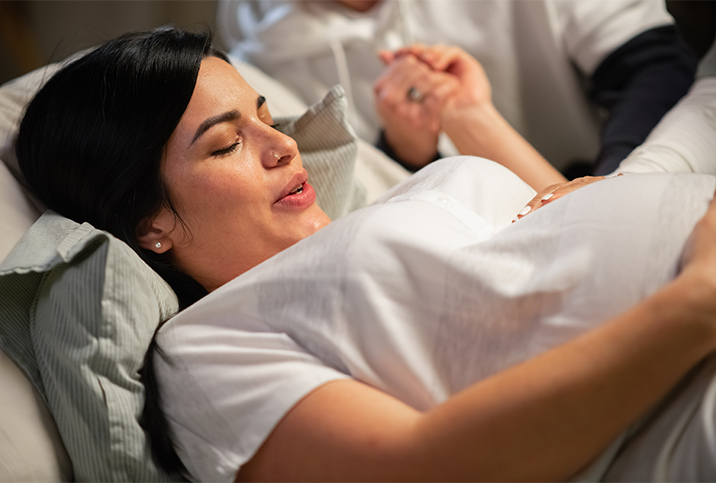What Childbirth Class Should I Take?

Despite being a natural process that's been going on since the dawn of humanity, having a baby is a big deal. There is so much to learn and prepare for, particularly for first-time parents, and it's no surprise that many people feel apprehensive about childbirth.
Birth education can be a powerful tool to assuage some of those fears and prepare you for what's to come.
"The more educated a person is, the less out of control they feel," said Talitha Phillips, a doula and the CEO of Claris Health, a women's health nonprofit organization based in Los Angeles.
There are many things you can't plan for during labor, but childbirth classes can help parents understand the process and feel more confident.
"They're adding knowledge or tools to their information tool chest that they may rely on," Phillips said.
Class recommendations
Many doctors recommend childbirth classes.
"Labor holds true to its name: It's work," said Kenosha Gleaton, M.D., an OB-GYN in Charleston, South Carolina, and the medical director at Natalist, a platform for fertility and pregnancy resources. "Just as you'd never sign up for a marathon and show up 10 months later without preparation, the same should go for childbirth."
Childbirth classes aren't usually required by your birthing center or hospital, but many providers do recommend them.
"Taking a childbirth class is a personal decision and something you have to think through on your own or with your partner," said Olivia DeLong, of Atlanta, who is the senior health editor at BabyCenter, an online parenting resource.
Classes help parents understand what to expect and learn ways to cope. They can help you know your options, make more informed decisions and think about what kind of birth you'd like (remember, though, birth plans can change).
Picking the right class
There are various options for childbirth classes, so when choosing, think about where you're planning to give birth and what your goals are. This approach can help you focus on the right style of class.
For example, if you're hoping for a low-intervention birth, look for a class that specializes in teaching coping techniques and comfort measures, recommended doula Alice Turner, a childbirth educator and past president at Lamaze International in Seattle.
There are various schools of thought around birth and there's no wrong or right way to have a baby, but it can be useful to identify what's important to you before you start a class.
'Classes should focus both on the psychological and emotional as well as the technical aspects of childbirth.'
"Find a childbirth class that aligns with your ideal birth," Gleaton said. "Classes should focus both on the psychological and emotional as well as the technical aspects of childbirth. It's also helpful to understand if the instructor's views on birth coincide with those of your healthcare provider and if the class is affiliated with a hospital."
You'll also want to factor in logistics.
"Class size, curriculum and course method—in-person versus online—are all things parents should consider when selecting the best class," she added.
Think about how much time you have, where the classes are and if they fit your schedule, and research the knowledge and experience of the person teaching.
Lamaze classes
Lamaze classes teach the process and options for birth, aiming to make women feel confident.
"Lamaze classes are centered around a pillar of birth practices, including letting labor start on its own, avoiding any medically unnecessary interventions, and keeping the mother and her baby together," DeLong explained.
Classes focus on pain-reduction techniques but also cover medical interventions and pain relief in an evidence-based manner. The classes do not teach a defined system for birth, however, so some parents may find the options overwhelming.
The Bradley Method
The Bradley Method teaches parents a system for birth based on using breathing to manage pain, the importance of diet and exercise during pregnancy, and the partner being involved—it's sometimes called husband-coached childbirth.
"[Classes] are excellent at not only educating the birthing person on labor but also her partner. It provides a helpful team mentality that can create incredibly strong and informed support systems," Phillips said.
However, she said the techniques are sometimes difficult to translate to a hospital environment.
Hypnobirthing
Hypnobirthing teaches techniques to relax your body, avoid stress and encourage natural birth. You can learn useful coping and management tools.
"They are great for people who want to have an unmedicated birth or who want to hold off on getting an epidural for as long as possible," Phillips explained. However, effectiveness is dependent on practicing out of class, and "sometimes they don't focus on the various challenges and curveballs of labor that might occur along the way," Phillips added.
Hospital classes
Hospital classes are offered in many settings, and many are free or low-cost. You may find it useful to investigate what is being taught and who is teaching the class.
"Hospital-based classes have been criticized for teaching more about being a good patient and less about the options that people actually have in labor," Turner said.
Other options include:
- Online classes, which can be done at your own pace
- Doula-led classes, which often focus on natural birth
- The Alexander Technique, which teaches postural alignment in the body
- Evidence-based birth classes with a strong emphasis on research
Are childbirth classes covered by insurance?
Some health insurance companies cover the cost of childbirth classes.
"The catch is that your insurer may require the class to be taught by a certified childbirth educator or a lactation consultant," DeLong said.
"Typically, you'll have to pay for the course and then submit a claim to your insurance company for reimbursement. The cost generally depends on what type of class you're taking or if it's a workshop-type class," DeLong explained. "General classes range from about $30 to $100, while more individualized or boutique-type workshops can cost up to $500."
Education is power, and with a wide range of classes available, you can pick and choose the one that works best for you and your family. You might even want to try a mix of classes if they're available to you.
"If you're not sure what's best for you, research the different methods, ask your healthcare provider and even attend informational sessions on each to learn more," DeLong advised.


















